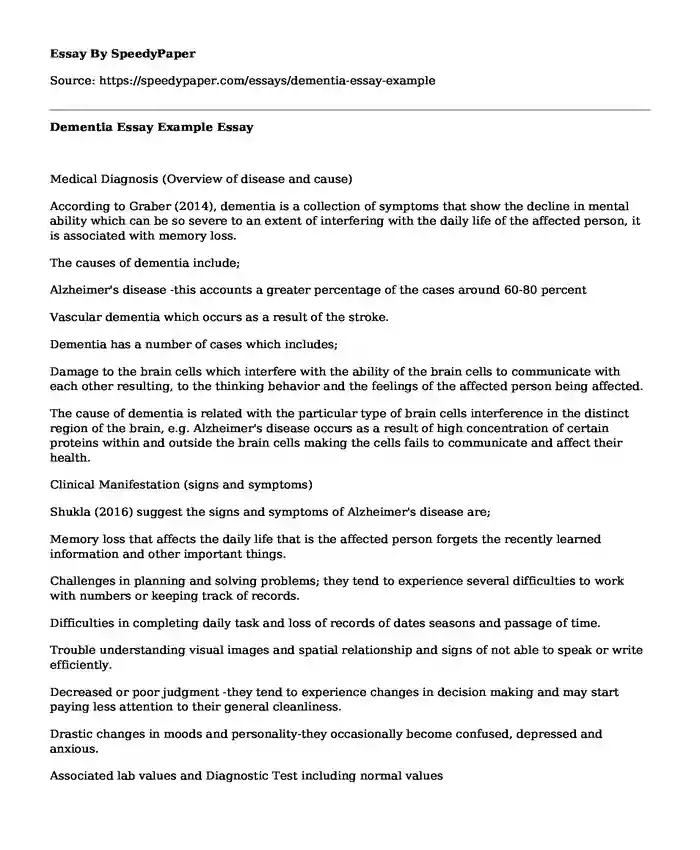Medical Diagnosis (Overview of disease and cause)
According to Graber (2014), dementia is a collection of symptoms that show the decline in mental ability which can be so severe to an extent of interfering with the daily life of the affected person, it is associated with memory loss.
The causes of dementia include;
Alzheimer's disease -this accounts a greater percentage of the cases around 60-80 percent
Vascular dementia which occurs as a result of the stroke.
Dementia has a number of cases which includes;
Damage to the brain cells which interfere with the ability of the brain cells to communicate with each other resulting, to the thinking behavior and the feelings of the affected person being affected.
The cause of dementia is related with the particular type of brain cells interference in the distinct region of the brain, e.g. Alzheimer's disease occurs as a result of high concentration of certain proteins within and outside the brain cells making the cells fails to communicate and affect their health.
Clinical Manifestation (signs and symptoms)
Shukla (2016) suggest the signs and symptoms of Alzheimer's disease are;
Memory loss that affects the daily life that is the affected person forgets the recently learned information and other important things.
Challenges in planning and solving problems; they tend to experience several difficulties to work with numbers or keeping track of records.
Difficulties in completing daily task and loss of records of dates seasons and passage of time.
Trouble understanding visual images and spatial relationship and signs of not able to speak or write efficiently.
Decreased or poor judgment -they tend to experience changes in decision making and may start paying less attention to their general cleanliness.
Drastic changes in moods and personality-they occasionally become confused, depressed and anxious.
Associated lab values and Diagnostic Test including normal values
Graber (2014) argue that there is no single test for diagnosis of dementia, the doctors instead diagnose other types of dementia and Alzheimer's disease based on careful medication history, laboratory test, the characteristics changes on the thinking, physical examinations and daily functioning and behavior associated with each type.
Dementia treatment and care vary depending on the cause of the given dementia.
Implications for nursing
Shukla(2016) added that nursing of dementia is of necessity to avoid and prevent further complications associated with the disease since the brain is so much important for an individual to survive hence there is the need for an implication of nursing to enhance fundamental knowledge about the brain nervous system to help reduce the burden of neurological disease.
Nursing assessment needed (physical, psychological, social, spiritual and economic)
There are several nursing examinations that are required for those suffering from dementia, they vary from physical, social, spiritual to economic assessment.
The physical assessment help rules out the causes of dementia that can be treated in identify signs of stroke and other related disorders that can lead to dementia.
Social assessment including social services should be provided for dementia diagnosed patients.
Alzheimer's disease significantly increases the health care cost and affect the quality of life of the patients and their caregivers. This need to be assessed and come up with suggestions on potential savings in healthcare cost and reduction of the burden to caregivers.
Common Nursing Diagnosis (NANDA)
M Coombs (2012) argued that NANDA is a body of professionals that take responsibilities for managing a list of nursing diagnosis which is of an essence to enhance the patient safety by standardizing evidence-based nursing diagnosis. This process enables the nurses to implement interventions.
Nursing intervention holistic care (include client/family teaching)
The nursing intervention is useful in obtaining reimbursement of the medical bill with the main aim of the nurses being to continuously provide increased patient care while promoting the patient safety.
The nurses provide intervention by even engaging the staff members and the patient family members for the betterment of their services. They involve them by offering training to them on how to effectively and safely handle the patient diagnosis with this disease.
References
An Expert Selection System for Medical Diagnosis. (2016). International Journal of Science and Research (IJSR), 5(6), pp.1625-1627.
Graber, M. (2014). Medical diagnosis - the promise. Diagnosis, 1(1).
M Coombs, K. (2012). Medical Microbiology and Diagnosis in the "Omic" Era. Journal of Medical Microbiology & Diagnosis, 02(01).
Shukla, D. (2016). Pott's Spine: Diagnosis and Management. Journal of Medical Science And Clinical Research.
Tecu, C. (2013). Viral Respiratory Infections with Bocavirus in Romania. Journal of Medical Microbiology & Diagnosis, 01(S1).
The 10th International Congress on Complementary Medicine Research in 2015 (ICCMR 2015). (2015). Integrative Medicine Research, 4(1), p.CO1.
Cite this page
Dementia Essay Example. (2022, Mar 15). Retrieved from https://speedypaper.com/essays/dementia-essay-example
Request Removal
If you are the original author of this essay and no longer wish to have it published on the SpeedyPaper website, please click below to request its removal:
- Essay Example on Foundations of Spirituality in Healthcare
- Drug Testing for Welfare Benefits, Essay Example at No Charge
- Computer Technology in Early Childhood Education, Essay Example
- Essay Sample: Youth Service Bureau and Its Impact to Society
- Literary Essay Example: The Natural as a Mirror of the Human
- Topic Introduction: US - Iran Relations
- Essay Example Dedicated to Dr. John Cade and His Discovery
Popular categories





